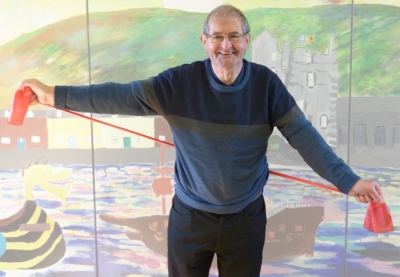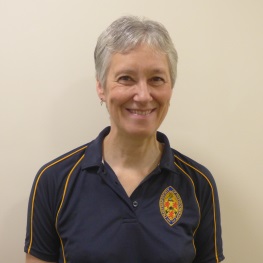Exercise: The new treatment for Multiple Sclerosis (MS)
© Margaret Gear MSc, MCSP. You may distribute this freely, provided that the article is reproduced in its entirety, not altered in any way, and attributed to its author and source.
In the past people with MS were often advised to avoid exercise. However, research has now shown that for people with MS, appropriate exercise is not only safe, but has an essential role in maintaining general health and wellbeing. This article summarises the effects of exercise for people with MS, looks at some of the barriers to exercise that people with MS can face, and suggests some solutions to allow people with MS to enjoy the essential health benefits that suitable, regular exercise can bring.
Can exercise be harmful for people with MS?
For people with MS, heat during exercise can bring on symptoms ranging from mild fatigue to what might feel like a sudden relapse. Scary as that experience may be, studies have shown that heat and induced symptoms are always temporary, and that they settle completely with rest and cooling. Specialist physiotherapists and exercise instructors can now design exercise programmes to minimise heat and fatigue. But if heat sensitivity symptoms are triggered accidentally then research shows that they do no long-term harm. Indeed, research studies have shown that exercise is safe at all stages for people with MS.
What are the benefits of exercise for people with MS?
It probably comes as no surprise that exercise improves muscle strength, aerobic capacity, walking and balance. Exercise also reduces the risk of cardiovascular disease and reduces bowel and bladder problems.
Some may be surprised, however, to hear that graded exercise reduces fatigue in people with MS. This might seem counter intuitive; isn’t exercising the last thing an exhausted person wants to do? The key here is the careful grading of the exercise. Research shows that graded exercise reduces fatigue in the long term. Your physiotherapist can advise on the best approach.
It is well known that exercise can boost general mood. We now know that exercise specifically improves symptoms of depression in people with MS. And studies have shown that exercise also improves general quality of life for people with MS.
Recent studies have even shown that for people with MS, cognition (thinking) gets better with exercise. While we need more studies to be certain of this effect, early results are encouraging.
Perhaps the most exciting area of research is the impact of exercise on brain health and the immune system. Several studies point to exercise actually having a neuro-protective effect on the brain. In one study of relapsing remitting MS, exercise not only reduced disability, but also led to fewer changes on MRI scanning. Some of the exercise group even showed signs of neuro-regeneration (improvement) on MRI. Larger studies are needed to confirm these promising results.
| Research findings on exercise in multiple sclerosis | ||
| Effect of exercise | ||
| General mood | Significant improvement |  |
| Depressive symptoms | Significant improvement |  |
| Quality of life | Significant improvement |  |
| Muscle strength | Significant improvement |  |
| Muscle activation | Significant improvement |  |
| Aerobic capacity | Significant improvement |  |
| Walking | Significant improvement |  |
| Balance | Significant improvement |  |
| Risk of cardiovascular disease | Significantly reduced |  |
| Bowel problems | Significantly reduced |  |
| Bladder problems | Significantly reduced |  |
| Fatigue | Significant improvement |  |
| Cognition (thinking) | Preliminary evidence of benefit |  |
| Neuro-protection | Preliminary evidence of benefit |  |
Overall, we can now be certain that exercise has an essential role in improving ability and quality of life for people with MS. So the question is: how much exercise is required?

The activity guidelines for people with MS
A Canadian team have analysed a huge amount of evidence to produce exercise guidelines specifically for people with mild to moderate MS. They recommend both resistance training and aerobic training, a minimum of twice weekly. But studies show that people with MS struggle to meet the guideline amounts of exercise due to the multiple barriers to exercise that they can face.
Barriers / difficulties with exercise in MS
In surveys, the top barrier to exercise for people with MS is fatigue. Fatigue can be among the most devastating of MS symptoms. However, exercise and education have been found to have a stronger effect in reducing fatigue than the two most commonly prescribed medications. It is important, however, not to ‘work through fatigue’ in order to avoid feeling worse. Take advice from a specialist physiotherapist about how to gently grade exercise to improve fatigue in the long term.
Remember that temperature can affect fatigue as well as affecting many other MS symptoms. If heat sensitivity is a problem try sipping cool water, using a fan, light clothing, a cool water spray, or a cool bath before exercise. And remember to take frequent rest breaks.
Dizziness can be overwhelming, and can prevent exercise all together. Dizziness can have many causes and should be assessed by your doctor or specialist physiotherapist. Visual problems are sometimes also related to vertigo. A specialist physiotherapist can often improve dizziness caused by vertigo with individually tailored vestibular rehabilitation.
Weakness, poor coordination and spasticity can all impact on confidence. An exercise programme should feel safe, and if done regularly will usually improve these symptoms. A specialist physiotherapist or exercise instructor can advise on the right exercises for each individual. Start with a low number of repetitions and when that feels easy then increase by no more than 10% per week.
Bladder and bowel problems can be off putting, but again your specialist physiotherapist or MS nurse can advise on management strategies. During exercise sessions for people with MS at Yasp Physiotherapy Clinic in Scalloway and at Clickimin Leisure Complex in Lerwick there are frequent toilet breaks and nearby toilet facilities.
Pain, depression and anxiety can make it hard to get started or even to think about exercise. Exercise has been shown to reduce depression and can often lessen pain, but professional help might be required from a specialist therapist or nurse in order to get started with a gentle programme that feels manageable.
There are no right or wrong exercises for people with MS. An exercise that feels good to an individual is likely to be doing them good. And each individual’s needs are different.
Bessie, who has had MS for many years says:
Doing exercise is good because it is something you can do by and for yourself. No-one else can do it for you. Whether it is just making sure you are sitting-up straight in your chair or making the effort to regularly do the exercises recommended by your physiotherapist, little by little it all helps. It’s amazing, you feel so much better when you can do more because you are feeling better.
Willie Malcolmson from Cunningsburgh describes his experience:
I started with Primary Progressive MS in September 1987. Walking and balance were my worst symptoms with drop foot getting worse causing me to fall quite often. My worst fall was at home where I dislocated my shoulder and broke my arm. I never got the movement back in my arm again fully.
When Margaret from the physio department suggested exercise classes I could not see how a semi wreck like me could do any exercises that would help. Physiotherapists Margaret Gear and Ruth Mahood organised an exercise class with half hour floor exercise and half hour walking and wall exercises. At first, I felt I would never be able to do enough and honestly thought the exercises were too hard for me. I was really amazed after two months doing classes twice a week at the improvement on walking and leg strength. When I started classes I could not lift my toes on my left foot off the floor. This caused me to stub my toes causing many falls. After a few months I was able to regain the ability to lift my toes a small distance and now I can pick them up nearly as well as on my right foot. If for any reason I cannot attend the classes getting back to doing it again can be tiring and it takes a few classes before I feel back to where I was. I am quite sure if the classes had not started I would not be as mobile as I am today.
Over the last few years the classes have been held at Clickimin Centre which has provided excellent facilities including air conditioning and easy access to toilet facilities which are both essential to the comfort of the participants. The staff and trainers have been brilliant providing specific knowledge for all conditions experienced by those who attend and I find that their knowledge and understanding of my condition is particularly beneficial to me.
I do believe that had I not been given the opportunity to attend these classes I would no longer be in a position to continue the hobbies and lifestyle that I currently enjoy. These exercises, together with the addition of social interaction would otherwise not be available to us as mainstream activities are not tailored to our specific needs in this way.
In summary, exercise is now known to be so beneficial for people with MS that it could be considered the new treatment for MS. However, people with MS can face many barriers to exercise. Specialist therapists and exercise instructors can help to manage these barriers to allow people with MS to enjoy better health through exercise.
Margaret Gear is a specialist neurophysiotherapist at Yasp Physiotherapy Clinic, Main Street, Scalloway, Shetland.
People from Shetland who have MS can have free physiotherapy assessment and treatment sessions at Yasp, or can join one of our free online exercise classes, funded by the Shetland group of the MS Society.
For more information or to make an appointment contact Margaret:
- By email at: info@yasp.scot
- By phone on: 01595 747074
- Or visit www.yasp.scot
